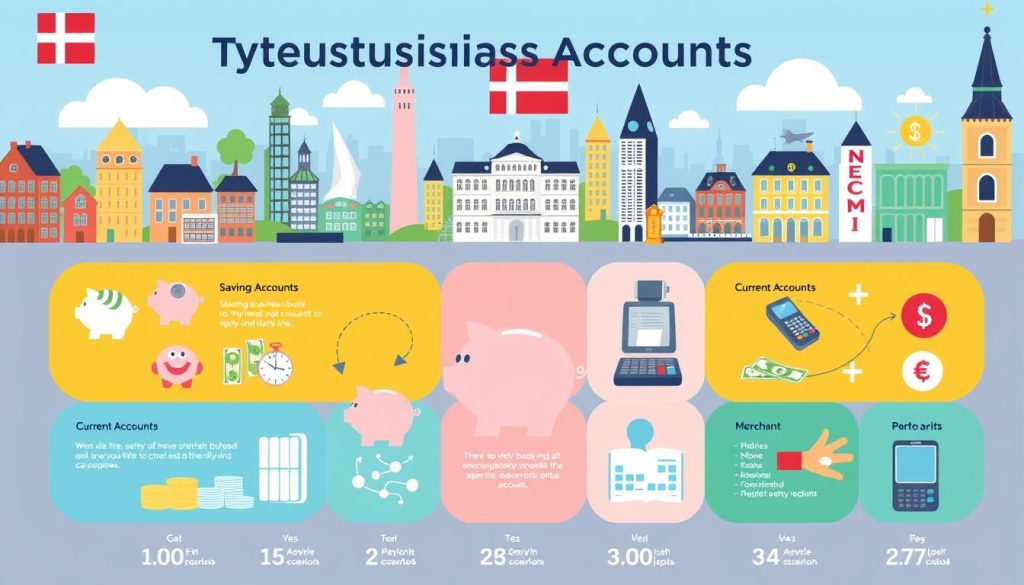For UK firms eyeing expansion in Denmark, grasping business banking is key. Danish banking services are complex, affecting everything from taxes to account handling. Knowing the banking rules and account options is crucial for UK businesses venturing into Denmark. This guide aims to simplify the Danish banking scene for UK firms.
Introduction to Business Banking in Denmark

The Danish business banking scene is perfect for UK companies looking for stability and new ideas. It has a wide range of banking services for different needs. This makes it easy for businesses to find what they need financially.
There are many financial products available, like current accounts, savings, and loans. Danish banks are also investing in new technology. This means clients get to use modern banking tools that make things easier and more convenient.
The rules and focus on customer service make Denmark a great place for business banking. Companies can count on reliable service and help from banks. This support is key to their financial success.
The Importance of Understanding Danish Banking Regulations

It’s crucial for businesses in Denmark to know about banking regulations. These laws protect against financial wrongdoings and promote ethical banking. Following these rules helps companies stay out of trouble and build trust.
Key areas of focus include:
- Anti-money laundering requirements that help prevent illicit activities.
- Consumer protection laws that ensure fair treatment of customers.
- Data protection regulations safeguarding customer information.
Knowing these banking rules helps businesses deal with Denmark’s financial system. Sticking to these rules makes operations smooth and builds a good reputation.
Types of Business Accounts Available in Denmark

In Denmark, businesses can choose from many types of accounts to meet their financial needs. It’s important for companies to understand these options to manage their money well.
Current Accounts for Businesses
Current accounts are key for daily financial tasks in Denmark. They let businesses make important transactions. Features include:
- Easy access to funds for operational expenses
- Facilitated payments to suppliers and employees
- Online banking options for convenient management
- Overdraft facilities to handle unexpected expenses
When picking a current account in Denmark, compare what different banks offer. This helps find the best account for your business.
Savings Accounts for Companies
Business savings accounts help firms grow their money and manage extra cash. They offer good interest rates and easy access. Benefits include:
- Interest accumulation on deposits
- Minimal withdrawal restrictions
- Options for setting savings goals and strategies
Using business savings accounts helps with financial planning and security. It ensures companies have enough money for future investments and needs.
Choosing the Right Bank for Your Business Needs

When picking a bank for your business in Denmark, many factors are important. It’s key to know the banking options Denmark offers and what UK firms need. Look at the services, fees, and customer support to choose the right bank.
Key Factors to Consider
- Types of Accounts: Check if the bank offers the accounts you need.
- Fees and Charges: Look at all costs to avoid surprises.
- Customer Support: Good support makes banking better.
- Online Banking Facilities: See if the bank’s online services fit your business.
- Reputation: Read what other businesses say about the bank.
Top Banks in Denmark for UK Firms
Several Danish banks cater to UK firms, each with its own benefits:
- Danske Bank: Offers detailed services for international businesses.
- Nordea: Has strong online banking, making finance management easy.
- Jyske Bank: Has good fees and services for foreign investors.
Business Banking in Denmark: Understanding Fees and Charges

It’s key to know the banking fees in Denmark to manage costs well. Companies face many fees that can affect their finances. Important fees include account maintenance and transaction charges for deposits and withdrawals.
Businesses also need to think about international transfer fees. These fees can change a lot between banks. It’s vital to compare these fees to save money. Knowing these costs helps in better financial planning and keeps businesses running smoothly.
- Typical banking fees in Denmark may include:
- Account maintenance fees
- Transaction charges for deposits and withdrawals
- International transfer fees for cross-border payments
Understanding and managing these fees can lead to big savings for businesses. This is over time.
Setting Up a Business Bank Account in Denmark

Setting up a business bank account in Denmark needs careful planning. You must have the right documents and know the setup process. This makes it easier for UK businesses to start in Denmark.
Documentation Required
You need to collect the right documents to open a business account in Denmark. Here’s what you’ll typically need:
- Proof of identity for account signatories, such as a passport or national ID.
- Business registration documents, showing your company’s legal status.
- Financial statements or a business plan, especially for new businesses.
- Tax identification number and relevant tax documents.
Step-by-Step Process
To set up an account, follow these steps:
- Find a bank that fits your business needs.
- Get all the documents you need, as mentioned earlier.
- Book a meeting with the bank to talk about your application.
- Fill out any forms the bank gives you.
- Submit your documents and check the account terms.
- After approval, put money in the account and start using it for your business.
Digital Banking Solutions in Denmark

The banking scene in Denmark has changed a lot with digital banking. More businesses are using online banking to make things easier. Mobile apps and online platforms are very helpful, especially for UK companies dealing with international banking.
Digital banking in Denmark has many good points, such as:
- It’s easier to access, letting users manage accounts anytime, anywhere.
- It gives real-time updates on transactions, helping with cash flow and spending.
- It has better security, keeping sensitive info safe.
Fintech solutions add even more benefits. They help automate tasks, cutting down on mistakes and improving speed. Digital payment systems make it quicker to pay or get paid, making business smoother.
As more businesses use these new tools, banking in Denmark is getting better. It helps with managing money and opens up new chances for growth.
Navigating Currency Exchange and International Transactions

For UK businesses trading with Denmark, knowing about currency exchange and international banking is key. Exchange rates can change a lot, affecting costs and financial plans. Understanding these can help with budgeting and managing risks.
Currency Considerations for UK Businesses
In Denmark, the Danish krone (DKK) is the local currency. UK companies need to watch the exchange rates to control costs. Important things to think about include:
- Exchange rates and their volatility
- Timing of transactions to secure favourable rates
- Currency conversion fees charged by banks and service providers
International Transfer Fees and Options
International banking comes with various fees. Knowing these can help cut costs. Common fees are:
- Fixed transaction fees for international transfers
- Percentage-based fees applied to the total amount transferred
- Additional costs for currency conversion during transfers
Looking into different transfer options is vital for saving money. You can choose from banks, online services, or fintech. Each has different fees and speeds. Finding the best one for your business is important.
Tax Implications of Banking in Denmark

UK firms need to understand Denmark’s tax environment. Taxation in Denmark includes Value Added Tax (VAT) and other policies. Knowing these helps with tax compliance, avoiding penalties, and smooth finances.
Understanding VAT and Other Taxes
In Denmark, VAT is key in the tax system. Businesses must charge VAT on goods and services. This means they need to know the rates and rules well.
The standard VAT rate is 25%. This affects prices and profits. Keeping accurate records is also vital for VAT compliance.
There are other taxes too, like corporate income tax and payroll tax. Corporate income tax is on profits. This shows the need for smart financial planning.
UK firms in Denmark should manage their taxes well. A good plan helps follow tax rules, reduces financial risks, and keeps operations stable.
Utilising Banking Apps and Online Services

The way we bank in Denmark has changed a lot. This is thanks to banking apps and online services. They make managing money easy and quick.
Banking apps bring many benefits, especially for UK businesses in Denmark. They offer:
- Ease of use: Simple designs make it easy to use your accounts.
- Real-time transactions: You can see your money moves right away. This helps keep track of your cash flow.
- Access to financial data: You get all the info you need to make smart choices fast.
Mobile banking lets you manage your money anywhere. This means you can do banking tasks while on the move. It saves time and boosts productivity.
Using online financial services every day can make things a lot smoother. They have top-notch security and are always available. This means UK businesses can rely on their money being safe. Using mobile banking helps them succeed in Denmark’s fast-paced market.
Customer Support and Resources Offered by Danish Banks

Good customer service in Denmark is key for UK businesses to thrive. Danish banks are known for their top-notch support for businesses. They make sure companies can handle their finances smoothly.
Danish banks have many ways to help their customers:
- Dedicated business advisors who offer personal advice and insights.
- Online systems for fast problem solving and information.
- Several ways to get in touch, like phone, email, and chat.
The help businesses get from Danish banks can really make a difference. Using these resources, companies can get the support they need. This helps them set up and run their operations in Denmark.
Common Challenges in Danish Business Banking

UK firms face many obstacles when dealing with Danish banks. It’s key to know these challenges to run smoothly. Language barriers are a big problem, causing misunderstandings.
Language Barriers
Language can be a big challenge in banking. Even though many Danish bankers speak English, small differences in language can cause problems. Using interpreters or bilingual materials can help a lot.
Navigating Cultural Differences
Knowing about cultural differences is vital. Danish business ways can be very different from the UK’s. This knowledge helps in building better banking relationships.
Staying Compliant with Danish Banking Laws

Keeping up with Danish banking laws is crucial for businesses. It’s important to know the legal rules to avoid fines and keep operations smooth. Companies must follow many rules, like reporting to be open and responsible.
Following anti-fraud rules is key. Businesses need strong systems to spot and report odd activities. Not doing this can cause big problems, like legal trouble and harm to reputation.
To build a strong compliance plan, businesses should:
- Train staff on compliance rules and steps.
- Work with legal experts who know Danish banking laws well.
- Do internal checks to see if rules are followed.
- Have clear ways to report any compliance issues.
Future Trends in Business Banking in Denmark
The future of banking in Denmark is set for big changes. New tech and what customers want are leading the way. By 2024, digital banking will be key, with banks focusing on making things better for users.
This change is a chance for UK businesses to get better at what they do. They can make things easier for their clients as things evolve.
The rules for banks are also changing. This affects how businesses deal with money matters. Keeping up with these new rules is vital for success in Denmark.
UK companies need to be quick to adapt. They should use the latest in banking, like better mobile apps and security. This will help them grow and stay ahead in the fast-changing world of finance.

